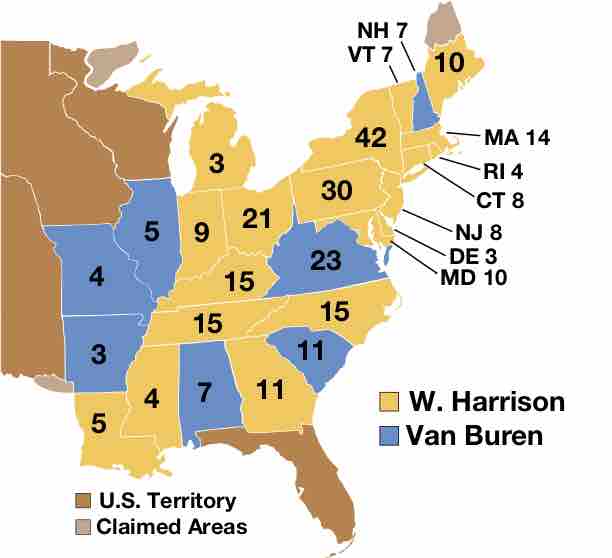The Election of 1840
The United States presidential election of 1840 saw President Martin Van Buren fight for reelection against the backdrop of economic depression. The opposing Whig Party was unified for the first time behind war hero William Henry Harrison, who utilized his "log cabin campaign" to recruit voters alienated by the national economic climate. Rallying under the slogan "Tippecanoe and Tyler, too," the Whigs easily defeated Van Buren .

Electoral College Map, 1840
Presidential election results map: Orange denotes states won by Harrison/Tyler, Blue denotes those won by Van Buren and one of his three running mates. Numbers indicate the number of electoral votes allotted to each state.
Democratic Candidates
Van Buren, the incumbent, was renominated in Baltimore in May 1840. The party refused to renominate his sitting Vice President, Richard Mentor Johnson. In the electoral college, the Democratic vice presidential votes were divided among Johnson, Littleton W. Tazewell, and James Knox Polk.
Whig Candidates
For the first time in their history, the Whigs held a national convention to determine their presidential candidate. It opened in Harrisburg, Pennsylvania, on December 4, 1839, almost a full year before the general election. The three leading candidates were William Henry Harrison, a war hero and the most successful of Van Buren's opponents in the 1836 election; Winfield Scott, another general and a hero of the War of 1812 who was active in skirmishes with the British in 1837 and 1838; and Henry Clay, the Whigs' congressional leader and former Speaker of the House.
Clay led on the first ballot, but circumstances conspired to deny him the nomination. The convention came on the heels of a string of Whig electoral losses. Harrison had managed to distance himself from the losses, but Clay, as the party's philosophical leader, could not. Had the convention been held in the spring, when the economic downturn led to a string of Whig victories, it is likely that Clay would have had much greater support. As a result, the nomination went to Harrison.
Because Harrison was considered a Northerner, the Whigs felt it politically expedient to balance the ticket with a Southerner. Another important consideration was that the vice presidential nominee should be a Clay supporter, so as to appease that faction of the Whigs and unite the party. After being turned down by several Southern Clay supporters, the convention finally found a Southern nominee who had faithfully supported Clay throughout the convention who was willing to run: former Senator John Tyler of Virginia.
In the wake of the Panic of 1837, Van Buren was widely unpopular, and Harrison, following Andrew Jackson's strategy, ran as a war hero and man of the people. By contrast, Harrison accused Van Buren of being a wealthy snob who lived in luxury at the public's expense. Although Harrison was comfortably wealthy and well educated and it was Van Buren who had actually come from a relatively poor, working family, Harrison's "log cabin" image caught fire, sweeping all sections of the country.
Harrison was the first president to actively campaign for office, but he avoided campaigning on the issues, particularly slavery or the national bank. He developed a popular slogan "Tippecanoe and Tyler too," which referred to Harrison's military victory over a group of Shawnee Indians at a river in Indiana called Tippecanoe in 1811. Meanwhile, his Whig Party focused on attracting a broad political coalition rather than making ideological alliances.
Democrats made fodder of Harrison's age, referring to him as "Granny" and hinting that he was senile. Said one Democratic newspaper: "Give him a barrel of hard cider, and…a pension of two thousand [dollars] a year…and…he will sit the remainder of his days in his log cabin. " Whigs, eager to deliver what the public wanted, took advantage of this and declared that Harrison was "the log cabin and hard cider candidate," a man of the common people from the rough-and-tumble West.
Results
Harrison won the support of western settlers and eastern bankers alike. The extent of Van Buren's unpopularity was clearly demonstrated in Harrison's victories in New York, the president's home state, and in Tennessee, where the state's aging hero Andrew Jackson came out of retirement to stump for his former vice president.
Few Americans were surprised when Van Buren lost by an electoral college vote of 234 to 60, but many were amazed by the close popular vote. Of 2,400,000 votes cast, Van Buren lost by only 147,000. Given the economic circumstances and Van Buren's apparent insensitivity towards the average American's plight, it is surprising that the Democrats did as well as they did.
After giving the longest inauguration speech in U.S. history (about 1 hour and 45 minutes in freezing cold weather), Harrison served only one month as president before dying of pneumonia on April 4, 1841.